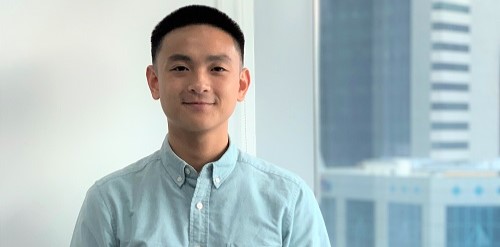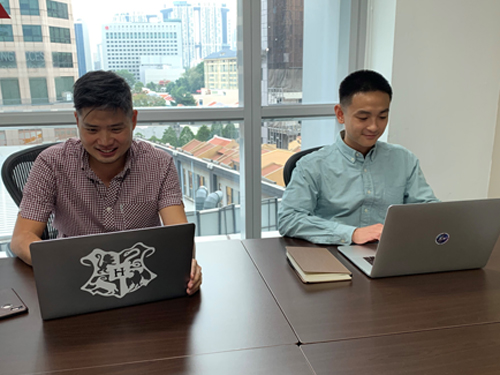
Since his undergraduate days at SMU, Kenny Lim (BSc(Econ) 2017) had demonstrated a keen interest in the maritime sector. As the President of the SMU Maritime Club in 2016, and the recipient of the Maritime Economics Excellence Award, these accolades testified to his dedication in the sector. Starting his career in the maritime industry upon graduation seemed an obvious choice.
However, after realising that there was a large gap in the digital capability of the maritime industry, Kenny pursued cross-disciplinary modules in coding during his final semester. Undeterred by his own unfamiliarity with the technological aspects, he further picked up courses to augment his understanding of the area. This is the story of how Kenny’s drive to learn led him to his desired job role, which married both the technological skillset he gained, with his expertise in the maritime sector.
Hi Kenny, you have an impressive track record in the area of maritime economics during your SMU days. What sparked your interest in maritime economy?
During an introductory talk conducted by the then Maritime Economic Concentration (a maritime-focused cluster of courses within the Economics major), I was intrigued by the cyclical nature of the shipping industry. I went on to take up the maritime economics courses offered by School of Economics. Through multiple internships, exposures, and meetings with amazing mentors deeply rooted within the shipping trade, I developed a keen interest in the dynamism. I also found myself encouraged by the camaraderie within the industry.
What made you pivot into your current role in the technology industry?
Upon graduating from SMU, I naturally pursued opportunities in the maritime sector for my first job. Recognising that the industry's adoption of technology was still in its infancy, I hoped to be the driver of technological change within the industry.
However, it became apparent that I did not have the technical skills required at that time. I needed to get my hands dirty, and do the groundwork in technology, before I could speak about making a change or a difference. It was tough as most companies in the maritime sector wanted people with more technical experience. Thus, I started looking into the technology industry.
Fortunately, I eventually found my current role with Megapixel Solutions LLP, an SME that builds digital solutions for our clients’ business needs. At the time of my hiring, I had been searching for six months since my graduation, which qualified me to be hired under Workforce Singapore's Career Support Programme. The Career Support Programme is a salary support grant that helps companies offset the initial cost of hiring PMETs, and in Megapixel's case, it enabled the company to hire more project managers for new markets, such as the maritime industry. Thanks to this initiative, I had the opportunity to join Megapixel in this role, which allowed me to build on my technical skills, and at the same time apply my existing knowledge of the maritime sector.
What does your role comprise?
I’m currently a maritime projects consultant. At Megapixel, we help companies develop digital solutions. This entails understanding their business models, finding out their requirements, and filling in the gaps with digital solutions as much as possible. As a consultant, I manage IT projects for maritime businesses – overseeing the development, allocating manpower, and making sure that we hit necessary deadlines.

Kenny (right), with his boss, Jerry Lim (left), business partner at Megapixel Solutions.
How did you eventually develop your technical skills?
In my last few semesters at SMU, I had taken cross-discipline modules in coding, such as Computational Thinking, dealing with algorithms. That was how I realised that I was interested in the digital aspect of the maritime sector. The knowledge I gained from those modules provided the first stepping-stone. After I graduated, I took online classes and picked up Python, the programme language, whilst searching for the right role.
Last year, I also enrolled in a Python course, Python for Data, Ops and Things, using the Enhanced Training Support initiaitve by SkillsFuture Singapore. Coming from a non-IT background, these courses really helped to form a foundation and develop my capabilities. I am picking up Hypertext Preprocessor (PHP), another programme language, on my own, with course materials provided by Megapixel.
What were some of the challenges you faced in searching for this job role?
It was not easy, as most of my friends had gotten jobs before they graduated. However, I did not want to settle until I found a role I was really interested in, and could build on. Eventually when I found this role, it was intimidating at first as I was entering a field that I knew little about. Compared to people who had been studying technology for years, my knowledge was quite basic. Competing with them was daunting. Nevertheless, I decided to go for it, as there was untapped potential in the digital space of the maritime industry. I think I made the right move!

Kenny at his graduation ceremony in 2017
Did you feel demoralised when your friends already had jobs?
Not really, as I knew I wanted to be selective about what I wanted to do for at least the next two to three years. I do not believe in having one goal for the rest of your life, as goals will always change. At least for now though, this is my goal, and I wanted to position myself to start off the right way.
What are your goals for the next few years?
Personally, I believe that three years is a good measure of time to fully grasp the skill set and knowledge behind any endeavour. Currently, I utilise technical, communication and project management skills to effectively manage projects. A thorough understanding of the project’s goals and technical scope allows me to coordinate project activities to ensure that it is accomplished within the approved schedule and allocate necessary manpower. Overtime, with the right exposure, I aim to become a more well-rounded product owner.
What advice would you give to your juniors if they would like to enter an unfamiliar industry?
When I decided to explore the opportunities within the technology industry, it was not an easy move to make as it took courage to move into an unfamiliar sector that was filled with professionals who are experts in their field. However, I took the plunge because I saw the untapped potential of how the maritime landscape can be changed with technology. So my advice would be: Don’t take the leap only when you are ready. Take the leap when you think you are ready.
*********************
Find out more about Workforce Singapore’s Career Support Programme here: bit.ly/SMUApr19_CSP